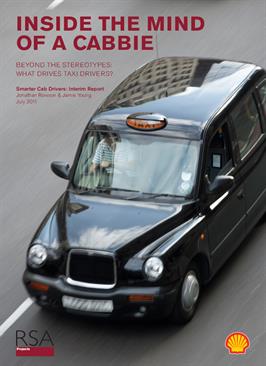Following from Shell's 'Smarter Drivers' campaign in 2010, which focussed on disseminating information on fuel efficiency, the RSA is seeking to deepen our understanding of how we might assist in turning helpful information about fuel efficiency into enduring dispositions for drivers.
Shell offer advice ranging from choice of fuel, driving speed, momentum, personal comfort and journey planning. However, knowing what you should do and actually doing it are very different things. In this exploratory study, the RSA is seeking to understand the potential for such positive behaviour change to become habitual, so that it can be performed without prompts or conscious thought, and contagious, such that it spreads through social diffusion to other drivers and passengers.
Energy scarcity is an issue for everybody, but some feel the pinch of this scarcity more than others. Those who fill up their fuel tanks on a daily basis as part of their working routine, like taxi drivers, are particularly motivated not to waste fuel, and their attempts to use fuel efficiently might therefore serve as an instructive example to the rest of us. Moreover, in addition to their financial motivation, the professional identity of cabbies is built upon their driving expertise and their singular capacity to influence passengers. We report on the relevance of these factors and other related insights in our upcoming interim report: Inside the Mind of a Cabbie.
This report recommends the following:
- Find ways to shift habitual behaviours.
- Behaviour change suggestions should involve raising awareness of social contagion rather than explicit instruction.
- Frame financial savings in tangible terms.
- Consider imaginative ways to tap into the civic pride and ambassadorial role that drivers already latently feel.
- A change in transport policy, or public subsidies to cabbies contingent on them promoting certain government policies, for instance on public health or indeed fuel efficiency.
- We hypothesise that the small investment of time to record fuel used throughout the day might serve as a helpful commitment device, by making the feedback more tangible and meaningful to the driver.
pdf 3.5 MB
Contributors



Be the first to write a comment
Comments
Please login to post a comment or reply
Don't have an account? Click here to register.